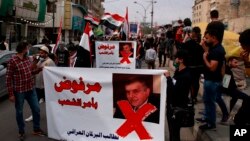Iraq’s prime minister-designate announced his withdrawal from the post Sunday night after failing to secure parliamentary support for his Cabinet selection, prolonging the political deadlock in the country amid multiple economic, health and security challenges.
Prime Minister designate Mohammed Allawi blamed political parties he did not name, saying they “were not serious about implementing reforms that they promised to the people” and accusing them of placing obstacles in the way of a new and independent government.
“If I agreed to offer concessions, I would be prime minister now, but I tried everything possible to save the country from sliding toward the unknown and resolve the current crisis. But the negotiations hit repeated snags,” he said in a short address to the nation, explaining his decision to withdraw. He accused some parties of negotiating “purely for narrow interests.”
Allawi’s withdrawal a month after he was selected for the post plunges the country in more uncertainty at a critical time and as the country weathers troubled times, including ongoing anti-government protests and the constant threat of being ensnared by festering U.S.-Iran tensions.
Shortly after he spoke, two mortar shells landed in Iraq’s Green Zone where the U.S. Embassy and government offices are located, without causing any injuries, two security officials said. The officials spoke on condition of anonymity in line with regulations.
Iraq on Sunday marked five months since a popular uprising against the country’s corrupt political class erupted in Baghdad and southern provinces. Iraqis took to the streets in the thousands on Oct. 1 to decry rampant government corruption, unemployment and poor services. Demonstrators rejected Allawi’s candidacy outright, saying he was the choice of the political elite and not the street.
Iraq also faces multiple challenges including on the economic and security fronts, and the most recent challenge of containing the coronavirus, with a failing health system and 19 confirmed cases so far.
Allawi’s withdrawal came after he twice failed to secure a quorum for parliament to meet to vote on his Cabinet selection.
Allawi’s cabinet formation process was beset with political turmoil as opposing factions threatened to withdraw support over the prime minister-designate’s secretive selection of ministers -- unusual in the country’s power-sharing system — while in the streets of Baghdad, anti-government protesters camped in a central square for five months said they would reject his authority if early elections weren’t held.
An ambitious government program proposed by Allawi that included reforms and anti-corruption measures was criticized by protesters who said it was not enough.
He was selected as premier designate on Feb. 1, two months after Adel Abdul-Mahdi, now caretaker prime minister, resigned under pressure from anti-government protests.
The weeks leading up to Sunday’s Parliament session was marred by delays and political infighting as Allawi insisted he would select his own ministers — a move that alienated Kurdish and Sunni parties in particular and sparked threats of boycott.
With Allawi’s withdrawal, Prime Minister Barham Saleh now has 15 days to appoint a replacement.




